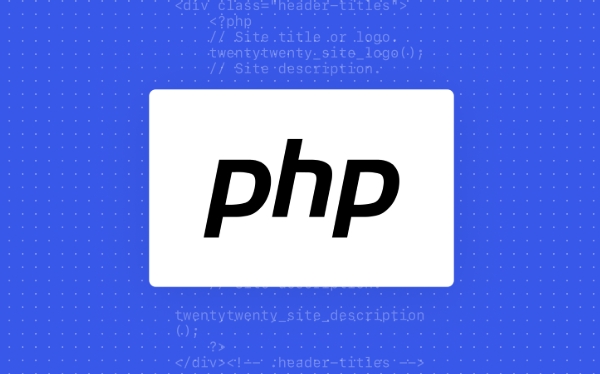$GLOBALS: A Historical Relic or a Misunderstood Tool?
Aug 03, 2025 pm 02:31 PM$GLOBALS is not inherently bad; it is a tool whose value depends on its use. It is an associative array providing access to all global variables, allowing functions to read global variables without the global keyword. Its negative reputation stems from encouraging global state, obscuring dependencies, promoting tight coupling, and making changes harder to track—issues tied to misuse, not the tool itself. However, $GLOBALS can still be useful in specific scenarios: 1. Legacy code maintenance where refactoring is impractical; 2. Simple scripts using $GLOBALS for basic configuration; 3. Advanced debugging or hook systems, such as in WordPress; 4. Rare cases like runtime patching or testing with temporary overrides. If used, best practices include documenting usage clearly, avoiding unnecessary modifications, not relying on it for core logic in new applications, and isolating its use to bootstrapping or configuration layers. In modern PHP, dependency injection and explicit parameter passing are preferred for better testability and maintainability. Therefore, while $GLOBALS remains functional and has niche applications, it should generally be avoided in favor of more predictable patterns—understand it, but choose not to use it without a justified reason.

$GLOBALS is one of PHP’s superglobals—global variables that are available in all scopes throughout a script. Over the years, it has developed a reputation as something to avoid, often labeled as a "historical relic" or a sign of poor coding practices. But is it truly obsolete, or is it simply misunderstood?

The short answer: $GLOBALS is not inherently bad—it’s a tool, and like any tool, its value depends on how it’s used.
Let’s break down what $GLOBALS is, why it gets a bad rap, and when it might still be useful.

What Is $GLOBALS?
$GLOBALS is an associative array that contains references to all variables defined in the global scope of a PHP script. For example:
$foo = 'hello';
function example() {
echo $GLOBALS['foo']; // Outputs: hello
}Unlike other superglobals like $_GET or $_POST, $GLOBALS gives you direct access to user-defined global variables from within functions, without needing to use the global keyword.

This behavior makes it powerful—but also dangerous if misused.
Why $GLOBALS Gets a Bad Reputation
Several reasons contribute to its negative image:
- Encourages global state: Relying on
$GLOBALScan lead to code that depends on global variables, making functions harder to test, debug, and maintain. - Obscures dependencies: When a function accesses
$GLOBALS['something'], it’s not immediately clear what external state it depends on. - Promotes tight coupling: Code that pulls variables from the global scope becomes tightly coupled to that scope, reducing reusability.
- Harder to track changes: Since any part of the code can modify a global variable, tracking down bugs becomes more difficult.
These issues are real and serious—especially in large applications or team environments where predictability and maintainability matter.
But blaming $GLOBALS itself is like blaming a knife for a bad cut. The problem isn’t the tool—it’s how it’s wielded.
When $GLOBALS Might Still Be Useful
While modern PHP development favors dependency injection, service containers, and explicit parameter passing, there are niche cases where $GLOBALS can be practical:
1. Legacy Code Maintenance
In older PHP applications (especially pre-OOP or procedural systems), $GLOBALS is often already in use. Refactoring everything at once may not be feasible. In such cases, understanding and safely working with $GLOBALS is necessary.
2. Configuration or Constants in Simple Scripts
In small utility scripts or shared hosting environments where simplicity is key, some developers use $GLOBALS to manage configuration:
$GLOBALS['config'] = [
'db_host' => 'localhost',
'debug' => true
];While constants or config files are better, this pattern isn’t catastrophic in tiny projects.
3. Advanced Debugging or Hook Systems
Some frameworks or debugging tools use $GLOBALS to inject data for inspection or to implement hook mechanisms. For example, WordPress (though controversially) uses global state extensively, and plugins sometimes interact with it.
4. Runtime Patching or Testing (Rare)
In very specific testing scenarios—like monkey-patching global variables during unit tests—$GLOBALS can be used to temporarily override values. However, this should be done cautiously and with cleanup.
Best Practices (If You Must Use It)
If you find yourself needing to use $GLOBALS, follow these guidelines:
- Document usage clearly: Make it obvious why a global variable is being accessed.
- Avoid modifying globals unnecessarily: Treat them as read-only when possible.
- Never use $GLOBALS for core logic flow in new applications: Prefer dependency injection.
- Isolate usage: Keep global access in bootstrapping or configuration layers, not deep in business logic.
Conclusion
$GLOBALS isn’t a “relic” in the sense of being broken or deprecated—it still works and has valid, albeit narrow, use cases. But in modern PHP development, it’s generally better to avoid it in favor of more predictable, testable patterns.
Calling it a relic oversimplifies things. It’s more accurate to say it’s a low-level feature that’s easy to abuse and hard to justify in well-structured applications.
So no, $GLOBALS isn’t evil. But unless you have a clear, justified reason, you’re probably better off without it.
Basically: know it, understand it, then choose not to use it.
The above is the detailed content of $GLOBALS: A Historical Relic or a Misunderstood Tool?. For more information, please follow other related articles on the PHP Chinese website!

Hot AI Tools

Undress AI Tool
Undress images for free

Undresser.AI Undress
AI-powered app for creating realistic nude photos

AI Clothes Remover
Online AI tool for removing clothes from photos.

Clothoff.io
AI clothes remover

Video Face Swap
Swap faces in any video effortlessly with our completely free AI face swap tool!

Hot Article

Hot Tools

Notepad++7.3.1
Easy-to-use and free code editor

SublimeText3 Chinese version
Chinese version, very easy to use

Zend Studio 13.0.1
Powerful PHP integrated development environment

Dreamweaver CS6
Visual web development tools

SublimeText3 Mac version
God-level code editing software (SublimeText3)
 The Security Risks of Unchecked Global State via $GLOBALS
Aug 03, 2025 pm 04:20 PM
The Security Risks of Unchecked Global State via $GLOBALS
Aug 03, 2025 pm 04:20 PM
Uncheckeduseof$GLOBALSallowsunintendedvariableoverwriting,enablingattackerstomanipulatecriticaldatalikeuserIDsorroleswithoutvalidation;2.Itincreasestheattacksurfacebybreakingencapsulation,makingfunctionsdependentonmutableglobalstatethatcanbeexploited
 Dependency Injection: The Superior Alternative to $GLOBALS
Aug 03, 2025 pm 03:56 PM
Dependency Injection: The Superior Alternative to $GLOBALS
Aug 03, 2025 pm 03:56 PM
Dependencyinjection(DI)issuperiortousing$GLOBALSbecauseitmakesdependenciesexplicit,whereas$GLOBALShidesthem.2.DIimprovestestabilitybyallowingeasymockingofdependencies,unlike$GLOBALSwhichrequiresmanipulatingglobalstate.3.DIreducestightcouplingbydecoup
 The Perils of Global State: Why You Should Avoid PHP's $GLOBALS
Aug 03, 2025 am 04:14 AM
The Perils of Global State: Why You Should Avoid PHP's $GLOBALS
Aug 03, 2025 am 04:14 AM
Using$GLOBALScreateshiddendependencies,makingfunctionshardertotest,fragile,andunreusable;2.Itcomplicatesunittestingbyrequiringglobalstatemanipulation,leadingtoslow,fragiletests;3.Globalstateisunpredictableduetouncontrolledmodifications,causingbugsand
 Refactoring Legacy PHP: A Practical Guide to Eliminating $GLOBALS
Aug 03, 2025 am 11:14 AM
Refactoring Legacy PHP: A Practical Guide to Eliminating $GLOBALS
Aug 03, 2025 am 11:14 AM
To eliminate $GLOBALS in PHP, it should first analyze its usage and then replace global variables with dependency injection, configuring objects, and step-by-step refactoring. 1. Use grep and other tools to find out all the usage of $GLOBALS and record the key names and locations; 2. Replace global variables such as database connections and configurations with explicit dependencies, such as injecting PDO or Config objects through constructors; 3. Create service classes (such as Logger, UserService) to encapsulate functions to avoid function dependence on global state; 4. Centrally manage the configuration, load from the configuration file returning the array, and inject the required classes; 5. Reconstruct the database in a small way, replacing a $GLOBALS reference at a time, and test to ensure consistent behavior; 6. Beware of including
 Debugging Global State Chaos Caused by $GLOBALS Manipulation
Aug 03, 2025 pm 01:46 PM
Debugging Global State Chaos Caused by $GLOBALS Manipulation
Aug 03, 2025 pm 01:46 PM
$GLOBALSmanipulationcancauseunpredictablebugsinPHP;todebugandresolveit,1.Understandthat$GLOBALSprovidesglobalaccesstoallvariables,makingstatechangeshardtotrack;2.DetectunwantedmodificationsusingstrategicdebugloggingandaGlobalsWatcherclasstosnapshotan
 Navigating the Minefield: Legitimate (and Rare) Use Cases for $GLOBALS
Aug 04, 2025 pm 02:10 PM
Navigating the Minefield: Legitimate (and Rare) Use Cases for $GLOBALS
Aug 04, 2025 pm 02:10 PM
Using$GLOBALSmaybeacceptableinlegacysystemslikeWordPresspluginswhereitensurescompatibility,2.Itcanbeusedtemporarilyduringbootstrappingbeforedependencyinjectionisavailable,3.Itissuitableforread-onlydebuggingtoolsindevelopmentenvironments.Despitethesec
 $GLOBALS vs. the `global` Keyword: Understanding the Core Differences
Aug 04, 2025 pm 03:59 PM
$GLOBALS vs. the `global` Keyword: Understanding the Core Differences
Aug 04, 2025 pm 03:59 PM
$GLOBALS and global are both used to access global variables in functions, but there are key differences: 1.$GLOBALS is a hyperglobal array that accesses variables through key names, such as $GLOBALS['var'], while global is a language structure, and global $var needs to be declared; 2.$GLOBALS does not require pre-declaration and can be used directly, global must be declared first and then used; 3.$GLOBALS supports dynamic access, such as $GLOBALS[$varName], global does not support dynamic declaration; 4.unset($GLOBALS['var']) will delete the global variable itself, while unset($var) is in global$v
 Analyzing the Performance Overhead of the $GLOBALS Superglobal
Aug 03, 2025 am 09:16 AM
Analyzing the Performance Overhead of the $GLOBALS Superglobal
Aug 03, 2025 am 09:16 AM
Theperformanceoverheadof$GLOBALSisminimalinmostcasesbutcanbecomesignificantinhigh-frequencyfunctionsorlong-runningscripts;1.$GLOBALScreatessymboltableandmemoryoverheadbymirroringallglobalvariables;2.Arrayaccessvia$GLOBALS['var']isslowerthandirectvari






